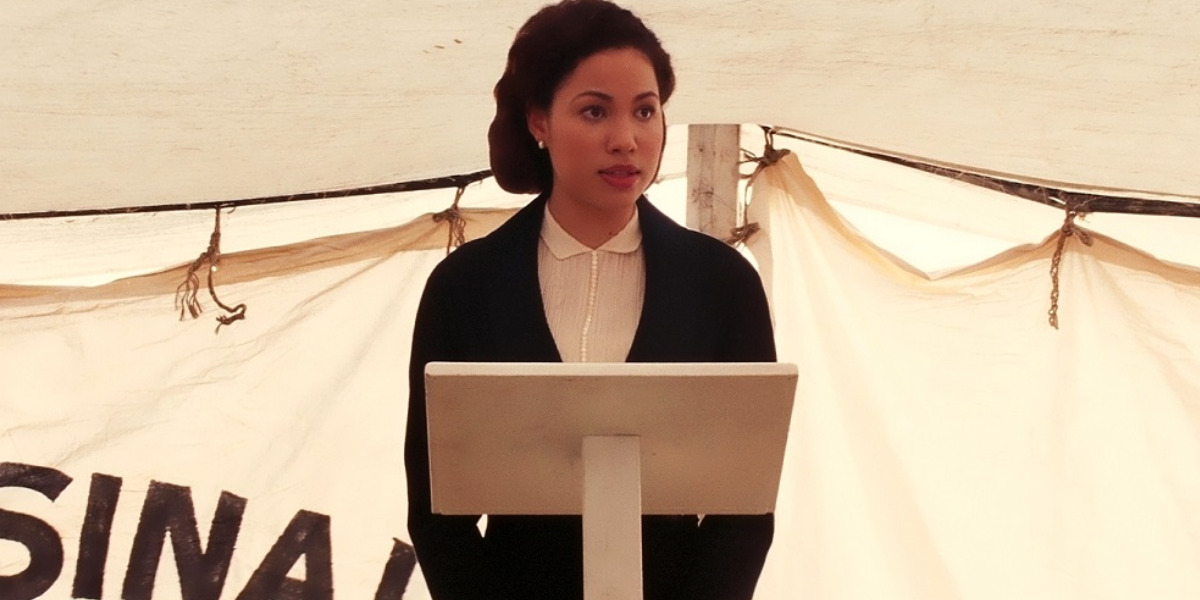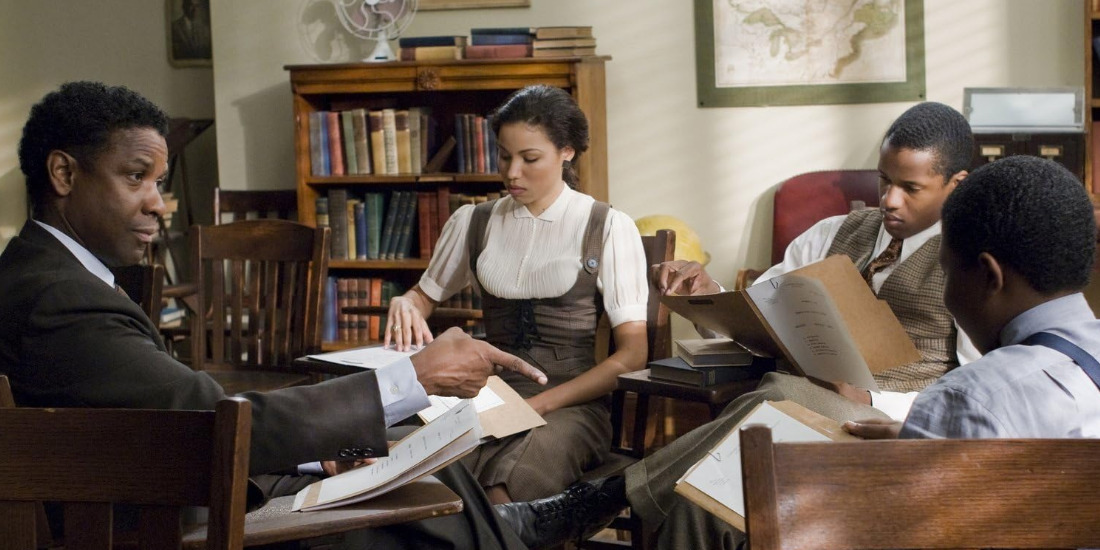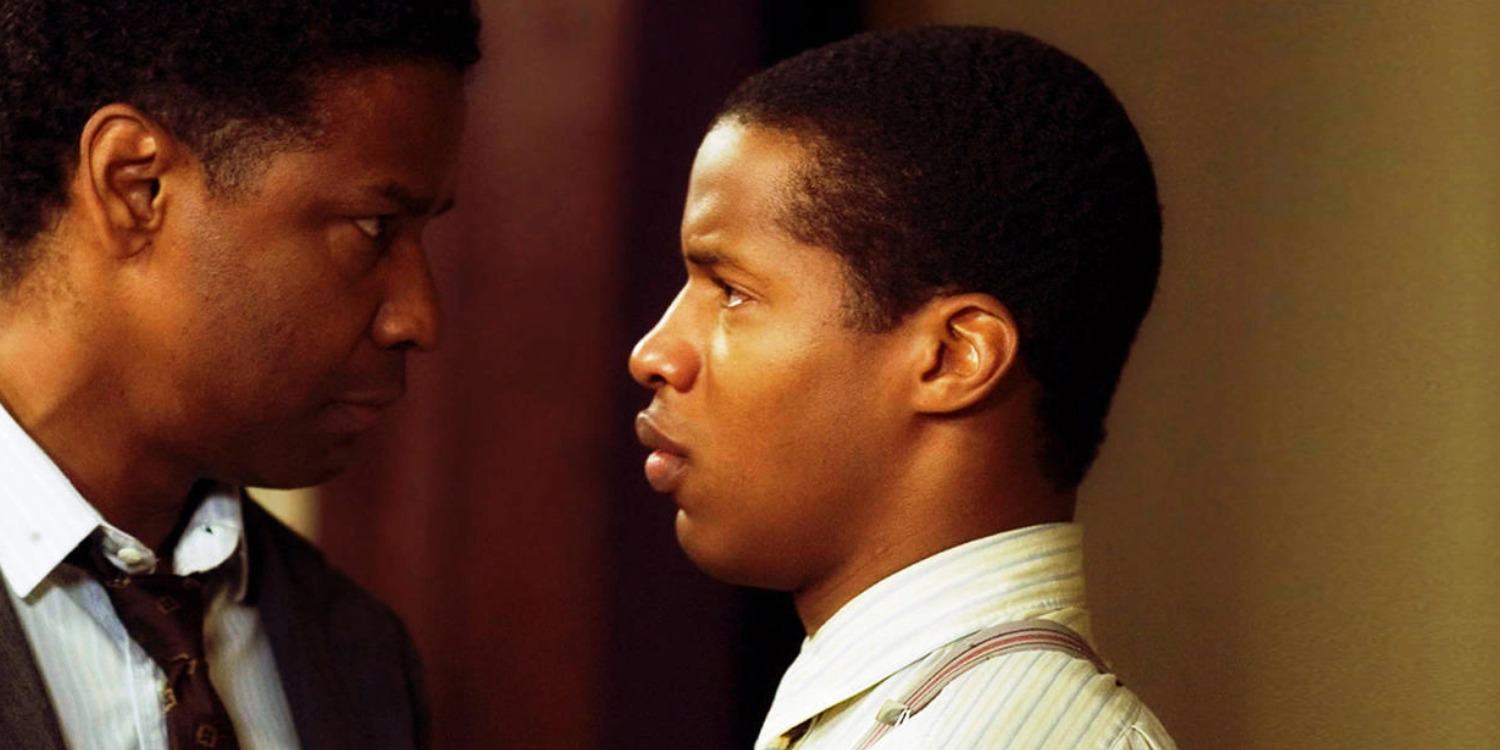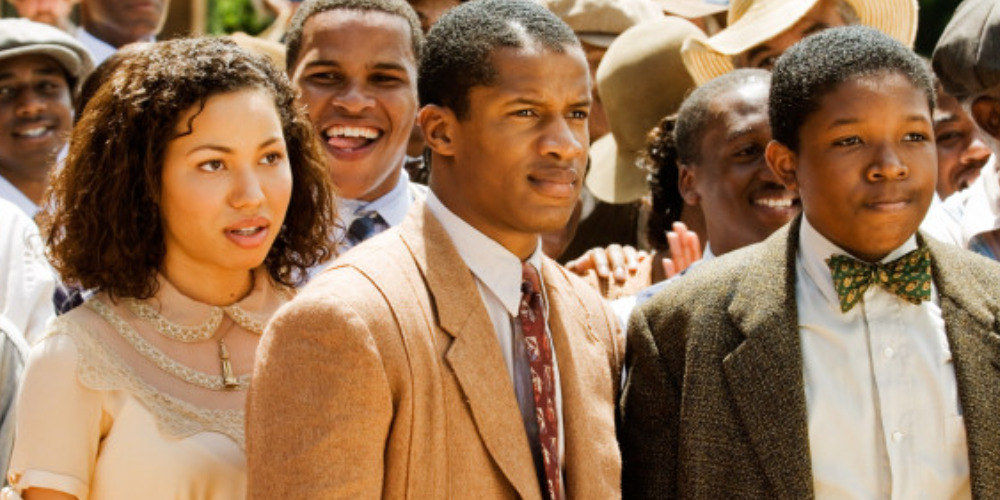Denzel Washington’s ‘The Great Debaters’ features a highly motivational story about a radical professor who inspires his young students to achieve monumental feats in the face of society’s racial biases. In 1935, in Texas, Wiley College Professor Melvin B. Tolson started a debate team with grand aspirations and even grander effort. As a result, he kindles his students’ spirits and helps them become some of the most commendable debaters in the game with an almost perfect track record. Thus, even with the odds stacked against them, Wiley’s Debate team takes on several white institutions, including Harvard University.
Students Samantha Booke, James Farmer Jr., and Henry Lowe, the secondary protagonists after Melvin, remain in the narrative’s center with a significant focus on their personal and academic growths. Considering the true story that inspired the film, these characters and their intricately woven storylines must lead the viewers to wonder about their possible connections to reality.
Samantha Booke and Henrietta Bell Wells
Unlike certain other aspects of ‘The Great Debaters,’ Jurnee Smollett’s character, Samantha Booke, is not directly based on a real-life person. Instead, one of Tolson’s former students, Henrietta Bell Wells, loosely inspired her character. As a result, even though Samantha shares many similarities with the real-life Wiley alumnus, there are also considerable distinctions setting the two apart.

Hailing from Houston, Wells attended the Texan Wiley College in 1930, where her freshman year brought a daunting yet exciting new opportunity for the young woman. Her quick thinking on the fly caught Tolson’s attention, compelling the professor to encourage her to try out for the debate team. Consequently, Wells was selected and became the first female debater on the Wiley Debate Team.
The same year, Tolson had decided to open up new horizons for his students by securing and winning a debate with the all-white institution, the University of Michigan Law School. Consequently, in 1930, Bell went on to participate in many challenges beside her teammates and participated in numerous historical interracial collegiate debates. Nevertheless, a year later, Wells quit due to financial and career-driven reasons.
Thus, despite her contribution to the team, Wells never actually debated for Wiley College in 1935, when the film’s major plot points unfold. Likewise, she wouldn’t have been a part of Wiley College’s historical 1935 win against the University of Southern California— a competition swapped out for a debate against Harvard University in the film.
Therefore, in interpreting Wells for the screen, the film fictionalizes some aspects of her characters, from her intentional transfer to Wiley for Tolson’s Debate Team to her participation in a monumental victory. Still, Wells’ experiences on Tolson’s Debate Team as the first female member provided evident inspiration for Samantha’s character.
In fact, Wells played a part in the film’s making in real life by consulting screenwriters Robert Eisele and Jeffrey Porro alongside Director Washington. She reportedly even encouraged the latter to star in the film as the central Melvin Tolson.
After Wells’s departure from the Debate Team, she continued her other courses, including Drama, a subject Tolson taught. Even after graduation, her ties to the institution remained with her Omega Psi Phi Colonel James E. Young Medal of Honor, received for her scholarship and service to Wiley College, standing as a pillar of her achievements. Later in life, she became the first African-American teacher at the all-white Bonner Elementary School. Professionally, she continued as an educator, alongside participating in social work.
In her personal life, Wells was a member of the St. James Episcopal Church for almost 40 years and married an Episcopal priest, Wallace Wells. Eventually, at 96, as the last surviving member of the 1930 Wiley College debate team, Wells passed away on February 27, 2008. According to reports, Wells died peacefully in her sleep.
James Farmer Jr., The Real Life Wiley Alumnus
Despite the varying fictionality of his fellow teammates, James Farmer Jr. finds his basis in an actual person. As depicted in the film, the real-life James Farmer Jr., a Texas native, attended Wiley College at 14, when he joined the Debate Team under Tolson’s mentorship. During his career as a Debater for Wiley College, Farmer reigned victorious over the University of Southern California alongside his teammates in the memorable 1935 competition.

As such, Denzel Whitaker’s character in the film remains the most authentic to the narrative’s 1935 timeline. In fact, several aspects of the character’s off-screen counterpart make it into the film’s central narrative, such as his father’s profession as a religious educator. Furthermore, Tolson and Farmer also shared a significant teacher-student bond, with reports of the professor’s influence inspiring the latter to change his path from Methodist ministership to activism.
Through his activism, Farmer left a monumental imprint on the world. He adopted Gandhian principles as a civil rights activist— a detail that became the thematic center for the film’s climactic showdown between Wiley College and Harvard University, referencing the real-life individual behind the character.
After graduating from Wiley College, Farmer attended Howard University and joined the Fellowship of Reconciliation, a pacifist group, after receiving his military deferral. Soon, in 1942, he sought to fight racial discrimination through non-violence and formed a political group, the Congress of Racial Equality, known as CORE.
By 1961, under Farmer’s leadership, CORE organized the Freedom Rides, a movement modeled to challenge local authority over segregation in bus travel. With his comrades— both Black and white activists— Farmer managed to compel Attorney General Robert Kennedy into passing desegregation in bus travel, even if his group faced some violence as a result of their political action. Still, according to Humanities Texas, Farmer considered Freedom Rides to be his proudest achievement.
Eventually, the activist went on to pursue a career in government service and teaching, receiving a Presidential Medal of Freedom in 1998. A year later, on July 9, 1999, Farmer passed away.
Henry Lowe And Henry Heights
Henry Lowe’s character was likely loosely inspired by Henry Heights, a long-term member of Tolson’s Debate Team at Wiley College. Compared to Samantha and James, Henry Lowe’s character decidedly has more subdued roots in reality, with his real-life counterpart paving a different debating career than his on-screen rendition.

While the film showcased Lowe as a force to be reckoned with who remains on the frontlines during competition from the start, the reality was different for Heights. According to reports, Heights joined the Debate Team around the same time as Henrietta Bell Wells in 1930. Yet, it wasn’t until 1934 that the man actually moved past his anchor man alternate position and to the forefront.
Although the same marks a notable departure from reality for Lowe, the character still holds a resemblance with Heights through their shared charm, acquaintanceship with James Farmer Jr., and tendency to get in academic trouble for drinking.
Ultimately, little is known about Henry Heights’ life following his departure from Wiley’s Debate Team. Although the film ends with the claim that Lowe, Heights’ counterpart, went on to become a minister after a degree in theology from the University of California, the same remains difficult to confirm through outside sources.
Read More: Best Student-Teacher Movies on Netflix


You must be logged in to post a comment.